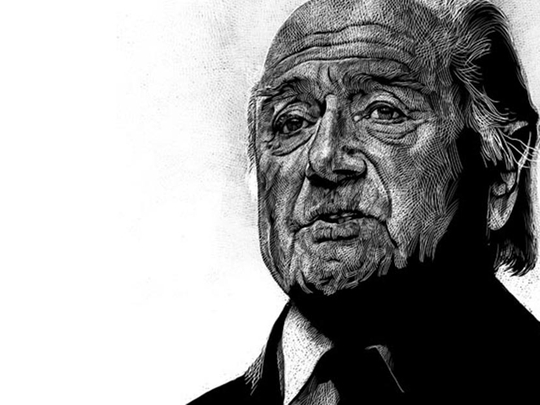
London: “Who got him? Who shot him? What happened between then and now?” asked the English Football Association’s chairman Greg Dyke, a former TV executive, as he pondered the downfall of Sepp Blatter, who announced his resignation as Fifa president on Tuesday.
Others may have put the questions in a less colourful way, but they were still the main ones on everyone’s lips.
As parts of the football world celebrated his departure, many could only ask how a man who last Friday was seen clasping his hands together and crying “Let’s go Fifa!” after his re-election to the top job at the sport’s governing body was now to be found surrendering quietly.
The contrasting image was now of 79-year-old Blatter being ushered off stage towards a back-door exit after a short resignation speech in Zurich, looking suddenly very fragile.
After all, this was Blatter we were talking about, widely known as the most able sports mover and shaker of his time. A modern-day Houdini who had won many skirmishes with opponents was never expected to depart so quietly.
So what did happen? What got Blatter to recognise so suddenly his time was up? Was it because FBI agents have just too much information about dubious payments involving Fifa officials to easily shake off their questions? Or was it just the understanding of a wise old politician who recognised that the squeeze being applied by everyone from disgruntled sponsors to unhappy former stars would lead to suffocation of his hopes for Fifa sooner rather than later.
In his departure announcement, Blatter sought to explain that his resignation was a noble gesture to help the game he loved, and there were plenty of his allies — and some foes — who were happy to play along with the narrative.
Michel Platini, the head of European football, who had urged Blatter to go last week, praised him for making “a difficult decision, a brave decision, and the right decision” while Jerome Champagne, a potential candidate to take over the job, admired his “sacrifice” to help Fifa.
Some of his delighted critics though, were not prepared to pull their punches.
“I don’t believe he went on any sort of moral basis because I don’t believe that’s the man,” said Dyke, a former TV executive. “I just don’t think he’s the sort of person who would suddenly have had a moral conversion on the road to Damascus and said, ‘Oh maybe I’m not the right person for football’. He would have hung on forever so clearly something has happened.”
Like what? A source close to Fifa told Reuters that in the wake of all the opprobrium heaped on the organisation since last week’s arrests of Fifa officials, pressure had been put on Blatter by officials on the executive committee and people in his inner circle to go.
Blatter was apparently told by the advisers who he has always listened to — even if he has often ignored their suggestions — that if he wanted to choose when and in what manner he would depart, he should do so now.
By doing so, he could point to the massive growth that Fifa has achieved during his 17-year reign, the successes in developing football across the world, and the advance of the game among women and youth.
For once, the source said, Blatter did what he was told.
Pressure from key Fifa sponsors behind the scenes may also have played an important part.
There was no great public outpouring of indignation from them after Friday’s Blatter victory, but Coca-Cola’s declaration after Blatter’s resignation speech on Tuesday gave an inkling of how some companies really felt.
“The announcement today is a positive step for the good of sport, football and its fans ... and will help Fifa transform itself rapidly into a much-needed 21st century structure and institution,” said Coke.
Adidas, another major sponsor, welcomed Blatter’s resignation. “Today’s news marks a step in the right direction on Fifa’s path to establish and follow transparent compliance standards in everything they do,” Adidas said.
Blatter’s removal appeared to be what many stakeholders wanted. “Problem solved. This was the major hurdle and changes everything,” said Andrew Woodward, a sports marketing consultant who was former director of public relations for Visa.
Ultimately, though, the fact that the US investigations into Fifa had begun to get ominously close may have persuaded him to depart now.
Late on Tuesday, it was reported that Blatter himself is being investigated by US prosecutors and the FBI.
Blatter has been accused of many things by his critics — yet he has never been so out of touch as not to recognise when the whole deck has been stacked against him.
“I do not feel that I have a mandate from the entire world of football — the fans, the players, the clubs, the people who live, breathe and love football,” he said in his departure announcement.










